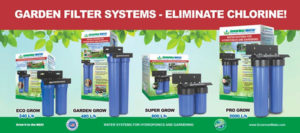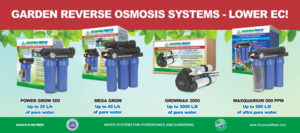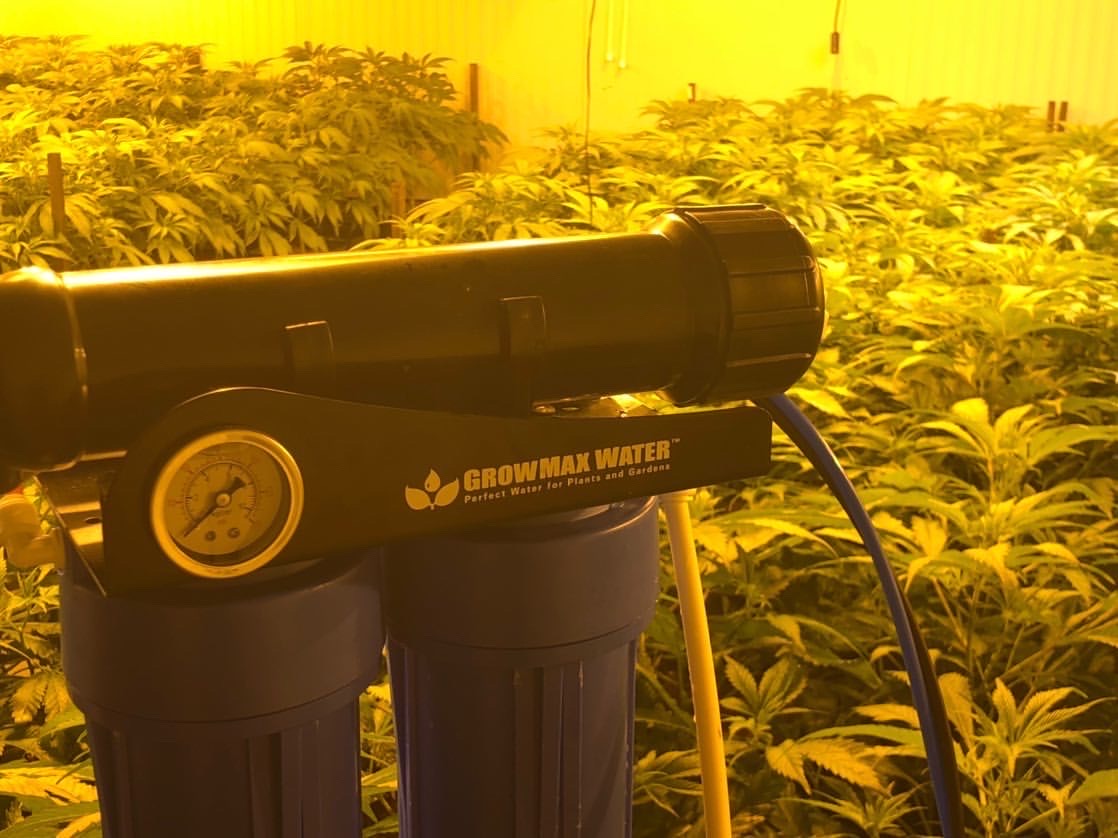Water is vital for plant nutrition, especially in cannabis plants as it participates in photosynthesis, helps maintain the internal temperature of the plant and most importantly: it transports all the nutrients present in the soil to the roots so that the plant can absorb the food it needs. Therefore, the type of water we use significantly affects plant nutrition and as such, we must make sure to water using the highest quality water possible. This is especially valuable when we want to produce large buds rich in THC (and/or CBD).
Currently, most growers water plants with tap water, but do you know that it contains different substances and unwanted elements? Do you know what they are? And the essential thing: Do you know how to eliminate them?
UNWANTED SUBSTANCES
To begin with, tap water contains, in greater or lesser amount, CHLORINE. Chlorine is a man-added chemical and is used primarily to kill bacteria, fungi, parasites and viruses from drinking water. In addition, during the hottest season chlorine levels are increased to prevent the proliferation of these microorganisms.
In addition to chlorine, water contains other dissolved substances such as mineral salts and HEAVY METALS. The term “heavy metals” refers to a set of metals that, without being essential, have a toxic effect on living beings.
Elements such as cadmium (Cd), mercury (Hg), arsenic (As), copper (Cu), cobalt (Co) and lead (Pb), among others, can accumulate in the plant and pass to humans through consumption.
WHAT WATER QUALITY ARE YOU USING?
There are different qualities of water, depending on the concentration of mineral salts it contains: soft and hard. Its classification is based on the concentration of minerals they contain and the unit of measure for this purpose is:
1 mg of contaminant/l = 1 ppm.
It is defined as hard water that which has a high content of dissolved minerals. Mainly, it contains a high content of calcium and magnesium. To measure its hardness, we observed how many milligrams of calcium salts are in a liter of water.
The range between 200 and 400 mg/l is the given range for hard water while between 400 and 550 mg/l is for very hard water. In general, tap water usually ranges from 170-400 mg/l. While not dangerous to humans, consuming this type of water is harmful to cannabis plants.
On the other side, soft water contains very few minerals. According to the water hardness scale, less than 150 mg/l is very soft water, while between 150 and 200 mg/l is simply soft water.
EXAMPLE
 Let’s say that an Indica variety, can support EC levels between 1.4 and 2.2 mS/cm, depending on the development phase. If we provide a water with 1.0 mS/cm of EC, the amount of nutrients that we can give to our plants will be between 0.4 to 1.2 mS/cm (the difference) to reach the desired levels. Instead, if we provide a water with low EC levels, the amount of nutrients that we can give to our plants will be much higher: starting from a pure base water, the plants will not absorb any unwanted elements, so we will increase to 100% the efficiency of the nutrients and fertilizers that we use; we will know at all times the amounts of what and how much plants eat, as well as help stabilize the pH.
Let’s say that an Indica variety, can support EC levels between 1.4 and 2.2 mS/cm, depending on the development phase. If we provide a water with 1.0 mS/cm of EC, the amount of nutrients that we can give to our plants will be between 0.4 to 1.2 mS/cm (the difference) to reach the desired levels. Instead, if we provide a water with low EC levels, the amount of nutrients that we can give to our plants will be much higher: starting from a pure base water, the plants will not absorb any unwanted elements, so we will increase to 100% the efficiency of the nutrients and fertilizers that we use; we will know at all times the amounts of what and how much plants eat, as well as help stabilize the pH.
So, now that you know what type of water exists and what’s in your irrigation water, you can now add a water treatment system to your set up. Depending on the quality of your water you only have to choose the system that best suits your needs:


If you want to know the 10 REASONS TO LOWER THE EC AND REMOVE THE CHLORINE FROM WATER, click here.

 Let’s say that an Indica variety, can support EC levels between 1.4 and 2.2 mS/cm, depending on the development phase. If we provide a water with 1.0 mS/cm of EC, the amount of nutrients that we can give to our plants will be between 0.4 to 1.2 mS/cm (the difference) to reach the desired levels. Instead, if we provide a water with low EC levels, the amount of nutrients that we can give to our plants will be much higher: starting from a pure base water, the plants will not absorb any unwanted elements, so we will increase to 100% the efficiency of the nutrients and fertilizers that we use; we will know at all times the amounts of what and how much plants eat, as well as help stabilize the pH.
Let’s say that an Indica variety, can support EC levels between 1.4 and 2.2 mS/cm, depending on the development phase. If we provide a water with 1.0 mS/cm of EC, the amount of nutrients that we can give to our plants will be between 0.4 to 1.2 mS/cm (the difference) to reach the desired levels. Instead, if we provide a water with low EC levels, the amount of nutrients that we can give to our plants will be much higher: starting from a pure base water, the plants will not absorb any unwanted elements, so we will increase to 100% the efficiency of the nutrients and fertilizers that we use; we will know at all times the amounts of what and how much plants eat, as well as help stabilize the pH.



